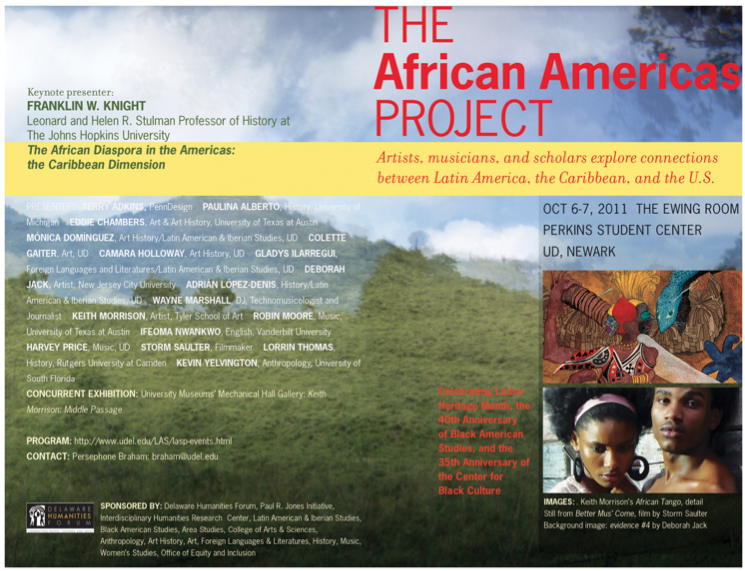I’m headed down to the University of Delaware tomorrow for “The African Americas Project,” a two-day symposium bringing together quite a mix of artists, musicians, and scholars to explore the connections between Latin America, the Caribbean and the US.
For my part, I’ll be talking about “Reggaeton’s Afro-American Address,” by which I mean the ways that reggaeton — despite a certain divisiveness — is best understood as a genre articulating a powerful synthesis of Afrodiasporic style which directly (and indexically, musically/semiotically speaking) addresses an Afro-American listening public (and here I use “Afro-American” — an outdated term in the US — in the broadest sense, as a term encompassing Afro-Jamaican, Afro-Puerto-Rican, Afro-Panamanian, and African-American styles and practices).
I’ll make this argument by revealing the secret of the mystery of the mighty dembow. Here’s a hint: the loop that turns up in the lion’s share of reggaeton productions is not sampled from Shabba’s seminal song, despite what Wikipedia and everyone else says. Nope. What you think was made in Kingston actually hails from Long Island! But you’ll have to catch the talk, or wait for a forthcoming article, to get the full scoop.
It’s an honor to be part of a program featuring so many distinguished speakers, among them keynoter Franklin W. Knight, a towering figure in Caribbean Studies. You can see the full program here (PDF), but let me also note, with some excitement, that another participant is none other than Jamaican filmmaker Storm Saulter, who will be screening Better Mus Come and other works tomorrow afternoon (and, awesomely, offering comment on the music panel I’m a part of on Friday).
If you’re in the area, do drop by. Should be a stimulating session.
Also, how refreshing to be described as a “DJ, technomusicologist, and journalist”! Works for me.

Hi dear mr. Wayne, ive been following your blog since 2008, and its been about a year that havent read anything about reggaeton coming from you!
i was wondering if an article is coming soon? or has reggaeton has died, since its first “death” in 2006, i would like to see what you have to say for its status, and its future,
thank you
Yes, I’ve been a little quiet on the reggaeton front (though I have discussed Dominican dembow here and there). It’s not anything to do with the genre dying (again?), but more with my shifting interests. I’m hoping the article will see the light of day soon, but sometimes physical press stuff can take a really long time.
That said, I don’t have too much new to say about reggaeton’s present or future. In some ways, I see signs that it is as alive as ever. (Choque!) In others, not so much. I think, though, that it will remain a potent musical resource for certain people for many years to come. But that’s the most specific my prognosticating is gonna get.
Thank you mr.wayne, i appreciate your response, i agree with your assesment.
anxiously waiting for your paper on reggaeton, i have already read your brilliant book REGGAETON with raquel rivera.
thats not fair. you never did let us on that secret about dembow?
i was always under the impression that it was made by a panamian-jamaican in newyork
Ha! Thanks for staying on the case. I’m sorry for the delay on the story. Been sitting on an article about it for a couple years, actually, and the publication recently folded, so now I’m looking around again. Soon!
But meantime, yes, the basic gist is that the version everyone samples in reggaeton is not from Shabba’s recording but from a cover of it produced in NYC by Jamaican and Panamanian collaborators.